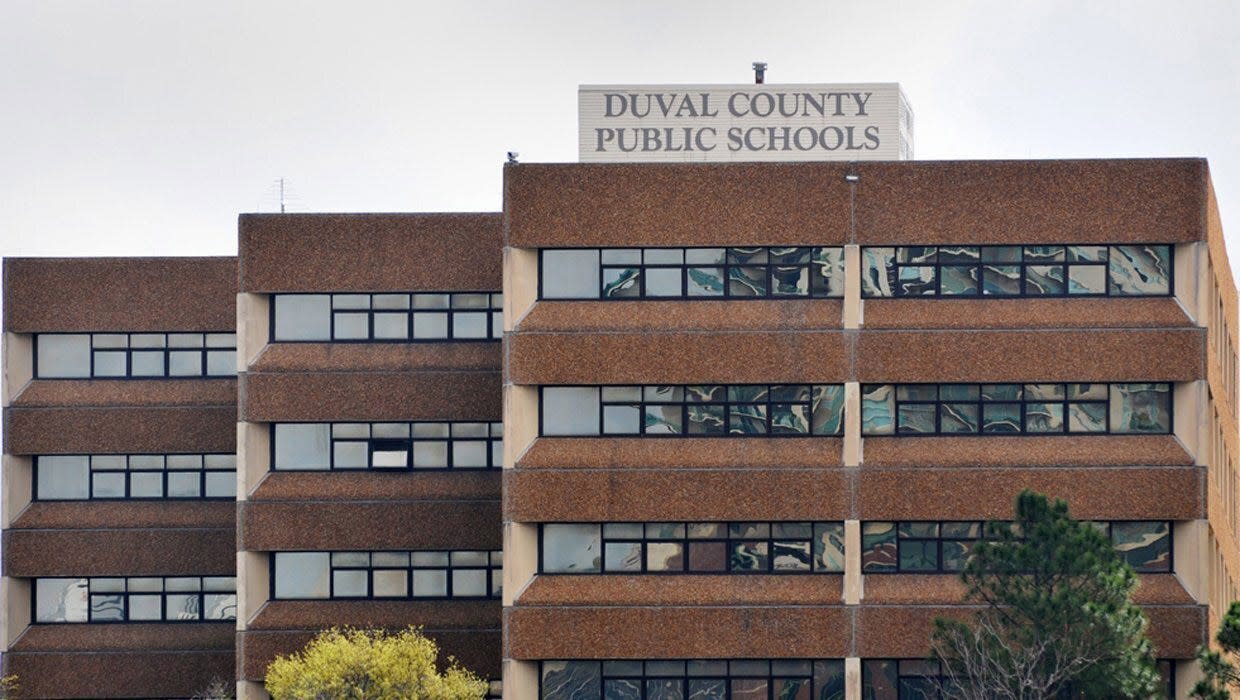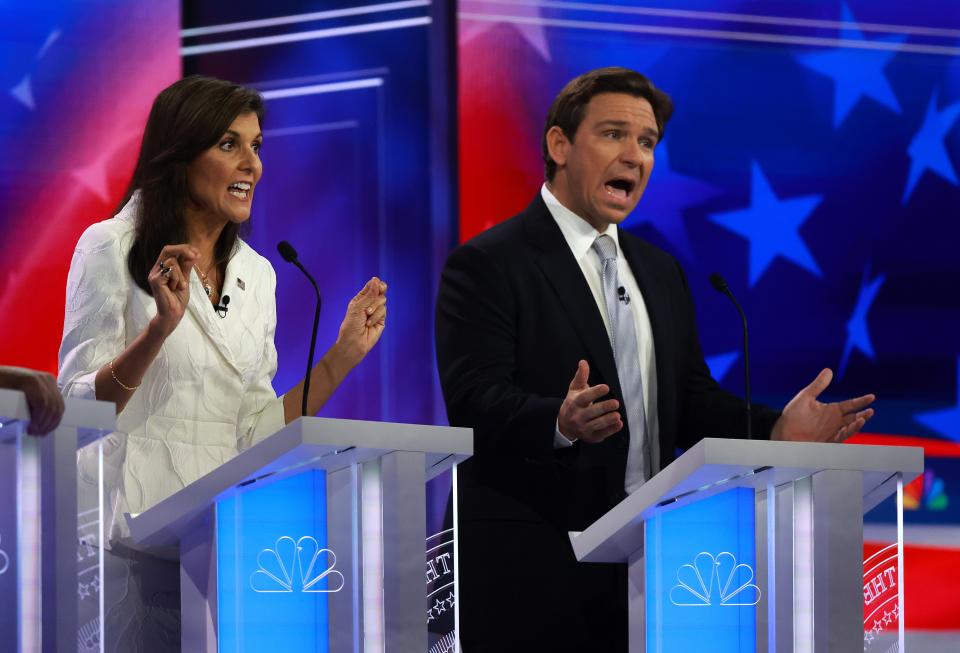Letters: Duval public schools, not charters, should keep all funds from sales surtax

Voters approved a sales surtax in 2021 to renovate our school buildings, some of which were over 50 years old. The City Council prevented us from voting on the referendum two years earlier when the referendum called for giving part of the funding on a “needs” basis to charter schools.
Then in 2020, the state Legislature approved HB 7097, with a provision that forced us to give our sales surtax to charter schools on a per-student basis if we wanted to raise funds to renovate our old neighborhood school buildings.
Charter schools appear to be using these funds to build new school facilities when taxpayers wanted the money to renovate existing neighborhood school buildings.
The School Board recently said they might not be able to follow the promises made in the Master Facility Plan established in 2020 because the state Legislature keeps easing the restrictions on which charter schools can receive this capital outlay funding.
On Nov. 2, I asked the Duval Delegation to ensure that capital outlay funded by local sales surtax dollars stays within Duval County Public Schools.
The district should include on the dashboard how charter schools are spending taxpayer money. However, I was told the state statutes don’t allow the district to ask their governing boards for that “additional” information. The Duval Delegation can fix that, and I even offered suggestions on wording.
I commend the state Legislature for trying to clamp down on real estate profiteering by the charter school industry, but they offered no enforcement mechanism. This can be corrected by specifically allowing school districts to withhold capital outlay funding if charter school governing boards do not submit documentation to verify that they are complying with HB 1259.
Passed in 2023, this law states that leases can’t be with related parties and must be at fair market value.
Susan Aertker, Jacksonville
Backwards Jax

There were two articles of great interest in the Times-Union on Nov. 5 that illustrate how Jacksonville remains backward relative to more progressive cities in the country.
The first article described how the city continues to deny less affluent Black neighborhoods the same courtesies and support that it provides to wealthier white neighborhoods. It stands to reason that if the city is going to bulldoze a wooded area and construct a new medical examiner’s office with a morgue ― across from a school and visible from people’s homes ― that it should first reach out to the community for feedback.
I hope the mayor will immediately order stoppage of the project while the city government works with the community and resolves their concerns. Issues of cost or convenience pale in the face of keeping a pledge and earning the trust of taxpayers, the people who are actually paying for the project.
The second interesting article pertained to the Philadelphia Eagles football stadium, where environmental issues were paramount in its design. Solar panels were installed that generate large amounts of electricity. Trash accumulated during the games is collected and separated so that 99% is recycled.
How much consideration was given to such environmental matters, as well as to climate change resilience, in the redesign of the Jacksonville stadium, currently being evaluated by the city government?
One area where Jacksonville does not lag other cities is with the existence of our daily newspaper. Thankfully, the Times-Union does not hesitate to keep our citizenry informed of both the bad and the good in the city government.
Nancy Urban, Jacksonville
Redirect the recall

Letter writer Juan Gray on Nov. 4 proposed a short nine-month leash on Mayor Donna Deegan, just four months into her term. Gray claims she’s ineffective as demonstrated by her loss of early (perhaps questionably chosen) political battles.
He doesn’t propose a better candidate, though hints at his own politics, which is ironic given an adjacent columnist’s appeal to drop party labels to advance nonpartisan elections. That’s highly unlikely given Florida’s profound identity partisan politics, as Gov. Ron DeSantis pushes for “party branding” candidates, even for nonpartisan school boards.
Mayor Deegan, a Democrat, won election by a solid five points, garnering bipartisan support. In the vein of “no good deed goes unpunished,” she chose two Republicans for important city offices, only to have them rejected by Republican City Council members.
While grudgingly accepting her victory, these members retain a compulsive agenda to baldly obstruct her administration at every turn, an administration clearly chosen by voters. It’s these personal and party agenda-driven, anti-voter councilors that should be subject to recall, not the mayor.
Florida is fertile ground for “against the will of the voters” rank activities: Yanking the vote from sentence-completing felons after being restored; denying recreational marijuana availability; restricting voter input to regulate gambling; and now, blocking an initiative to restore abortion access.
Redirect the recall idea.
Michael Miller, Ponte Vedra Beach
So, the funeral home is OK?

I was interested in the Nov. 5 article in Sunday’s paper about the planned new medical examiner’s office and the complaints by a neighborhood group. The complaint is that the city is ignoring the Neighborhood Bill of Rights, which is completely justified.
As I continued reading the article and looked at the site on Google Maps, I moved away from the indignation expressed by the neighborhood group. Now it’s a vacant lot with debris and junk scattered around. The complaint of “thinking about dead people in a building not even 200 feet from my home” was interesting, given the presence of a funeral home very close to the intended site.
Yes, there is the new Kipp School close by but I’m not sure if that is really a valid concern. The site will be secure, no doubt with frequent police presence.
It is a good location for the facility. The current one is near the UF Shands complex and borders a number of homes. I would think the dead body concern would also apply in the current location.
The writer’s comment about no neighborhood in Jacksonville wanting this facility convinced me that the complaints are more in the “Not in My Backyard” category than anything.
Dennis J. Egan, Jacksonville
The importance of Florida-friendly landscaping
A lush green lawn may appeal to our eyes but often spells of an alienated home for pollinators and wildlife. There are 4 million acres of grass lawns covering Florida that used to be habitat in the form of forests and grasslands. Across the entire U.S., grass lawns make up more area than the top eight crops combined.
Converting grass lawns is a step toward restoring our natural communities and simultaneously helping agriculture. Native wildflowers attract bees and other pollinators that we rely on for one-third of our food. Many native grasses in Florida require less mowing and less watering while staying short.
These grasses can still provide aesthetic beauty ― the flowers of purple lovegrass and lopsided indiangrass are great examples.
Numerous resources are available to help create a native lawn. The Florida Wildflower Foundation provides a fantastic guide for 20 easy-to-grow wildflowers. Please note, Florida statutes allow for “Florida-Friendly Landscaping” outside of homeowners' association regulations, but there may be other rules to consider first.
We can all act to make our yards at least a little bit more environmentally friendly. The birds, butterflies and bees are counting on us.
Audrey Plauche, Gainesville
DeSantis’ dictatorial tendencies

Gov. Ron DeSantis’ bid for the Republican presidential nomination is dead and buried, yet he continues to use taxpayer money to support his dormant campaign. If the state Legislature were not his toadies, his actions would be the subject of numerous investigations.
He helped evacuate at least 270 people from Israel to Florida. That is commendable on its face, but the cost works out to almost $15,000 per person. Is the state seeking reimbursement? Who authorized the expenditure?
DeSantis is also declaring “sanctions” against Iran. When did the governor achieve authority to set foreign policy? If I remember my civics classes, that is the responsibility of the U.S. Department of State.
The governor and his chief health officer, Joseph Ladapo, continue to endanger public health by making claims ― with no evidence ― that the COVID vaccine is not safe; meanwhile, Florida continues to be among the nation’s leaders in COVID deaths.
DeSantis has signed laws that shield his travels and expenditures from public scrutiny. These laws will surely be reversed in court, but they further demonstrate his dictatorial tendencies. We should all be relieved that his presidential bid has been an abject failure.
Jim Kavanagh, Jacksonville
Omitting party labels won’t help

On Nov. 4, a guest column was published by former City Council President Eric Smith, who is frustrated by the local partisan politics in Jacksonville that makes legislation difficult. He believes that if we drop our party labels in local elections then our local government can work better, and leaders can have more open and honest debates.
Like Smith, I long to have a government that works better and is not bogged down in partisan politics. However, dropping party labels will do very little to help our government work better. The problem isn't labels ― it is the growing deep ideological divide between Democrats and Republicans.
Republicans have become more conservative and traditional, while Democrats have become more liberal and have evolved into a more secular, socialistic party. So, there is little agreement between the two parties.
Smith seems to long for the “good old days” like when he was in office, when Democrats and Republicans had more in common. The fact is the two parties are deeply divided, and until we as a nation can resolve our ideological differences, then partisan politics will be the rule of the day.
Calvin Johnson, Jacksonville
Nonpartisan elections a good idea

I applaud the Nov. 4 guest column by former Jacksonville City Council member and president, Eric Smith. As the former mayor of Vail, Colo., for 12 years (1977-1985 and 2003-2007), I served with a seven-member council, all selected in a nonpartisan election. Being nonpartisan has many advantages, including facilitating collaborative problem solving for the common good of the community.
Mayors and council members can best serve their constituents without the divisive interference of party politics. The city of Jacksonville will benefit by dropping the requirement that city candidates identify their party affiliation. It is a simple, impactful way to " … support truly independent, creative governance."
Rodney Slifer, Ponte Vedra Beach
This article originally appeared on Florida Times-Union: Duval sales surtax passed for old public schools, not new charters

